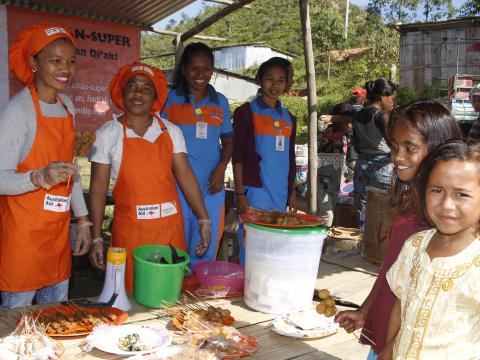Cooking competition boosts Alda’s business

In many rural areas of Timor-Leste, people have land, but they have no knowledge or skills to develop it. Farmers only plant one or two different crops each season, and without variety, they get a low price at the market. Some move to the capital, Dili, to find a job rather than continue their farming business. Alda, 35 years old from Aileu, used to have difficulties developing her farm and her business.
Through the Better Food Better Health project, World Vision is helping farmers like Alda to grow, eat and sell nutritious ‘superfoods’ to improve family nutrition and income. Parents learn how to cook meals for their children using local foods – meals that are not only nutritious but taste good too.
“When I heard World Vision was running a superfood cooking competition, I organised a women’s group in my community to enter,” Alda said. “My team won this competition. I was happy as I couldn’t believe that we made it with our own local products that we have on our farms. We cooked with six types of foods, including red kidney beans, soybeans, mung beans, moringa, eggs and orange sweet potatoes. We used these ingredients to make all kinds of food, like cookies, cakes, puddings, porridges, teas and satays,” she said happily.
After success in the competition, Alda started an event catering business and selling her cookies and cakes at the market. Now she is growing a variety of crops, and her business is doing well.
Alda’s husband Bernardo, 46 years old, works as a security guard, but he always makes time to help Alda in the farm and supports her in her business. “When I come home from work, I help my wife in the farm and take care of the kids,” he said. “My wife won the cooking competition held by World Vision,” he added proudly.
Their daughter, 12-year-old Octaviana, is happy with her mother’s business. Now she eats the local food prepared by her mother, rather than buying all imported food. “Now I can eat various foods and bring the rest to school as well,” she said.
Octaviana also helps her mother raise chickens, which provide nutritious eggs to eat every day. “We raise a lot of chickens at home. Every morning I like to feed them and watch those chickens try to take food from each other,” Octaviana said.
However, recently, COVID-19 has presented some challenges for the family. “It’s been two or three months, and I can’t sell my food collection at the market due to the lockdown. We have no customers to buy our food,” Alda explained. While she has been able to continue to grow her vegetables, there has been a rice shortage, so Alda has been forced to exchange her local crops for rice.
“During the lockdown, I didn’t go to school because the virus has begun to spread, so my teacher announced all the students have to just study at home,” said Octaviana. “Even we don’t have enough food, but we still run the farm to survive until the virus is gone. In the afternoon my parents and I go to the farm. I help my parents watering vegetables and cleaning the grass. I love to spend time on the farm as it has a lot of big trees, has shade everywhere, it is green, and I listen to the birds’ sounds. I like to listen as the birds are singing while we take a rest in the farm,” she said.
But the family is looking to the future. “I hope that after COVID-19 is gone, World Vision can rerun this cooking competition event to promote our local products and show my wife’s creativity and talent,” said Bernardo.
The Australian Government supports the Better Food Better Health project through the Australian NGO Cooperation Program (ANCP).